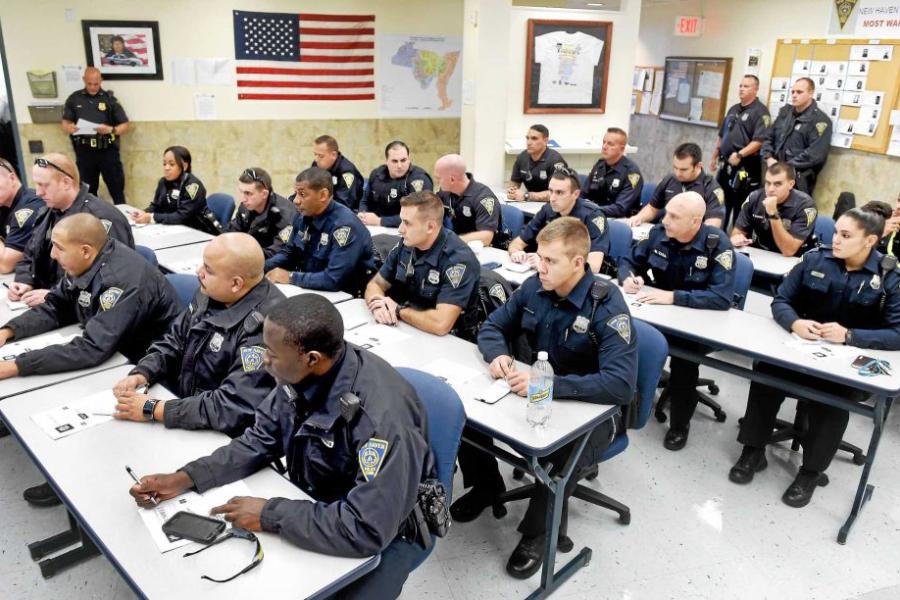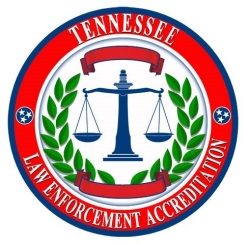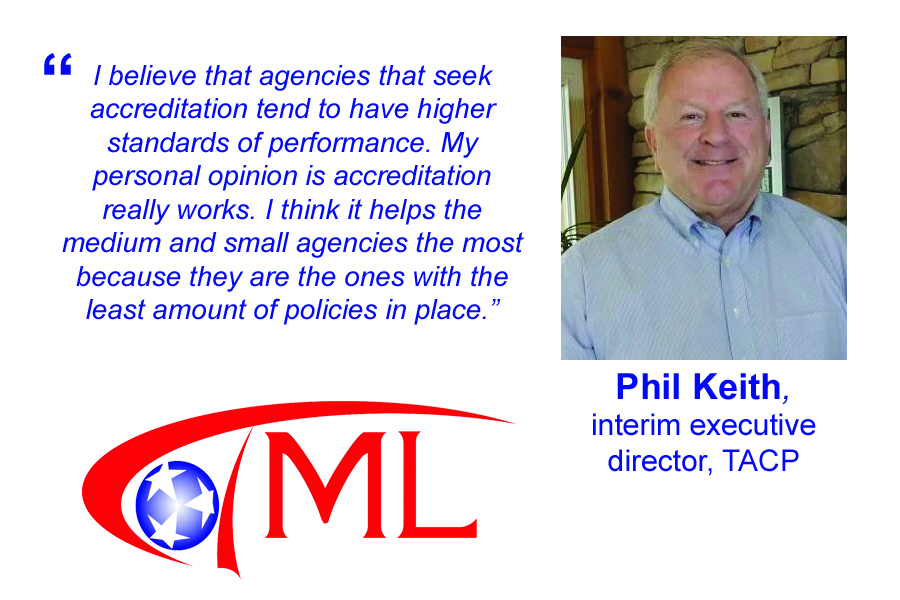Amid new requirements, accreditation benefits law enforcement

By KATE COIL
TML Communications Specialist
With a recent White House executive order making police accreditation a requirement for federal funds, many law enforcement agencies are re-examining accreditation and how it can benefit their departments.

The Tennessee Association of Chiefs of Police (TACP) has recently received a two-year $300,000 COPS federal grant to help pay accreditation fees specifically targeting smaller police departments. Funding will provide for accreditation fees, training and meeting attendance, as well as access to model policies and information systems support including online access to best practice policies.
“We have a unique opportunity and are one of only eight states in the country that received this funding,” said Philip Keith, TACP interim director. “If you look at the TACP, more than 75% of the members represent agencies that have 25 or fewer officers. Those size agencies are also the least accredited of any size agencies. If you embrace accreditation, you can establish a body of best practices that have been generally tested and have been proven. Where the difficulty comes in needing someone to do that work. To be an accreditation manager and a police chief at the same time can be difficult. That is the challenge of bridging that gap. We are at a place where we need to make things easier.”
Keith worked with Jim Cotter, the first executive director of CALEA, when he was developing CALEA standards. Keith also served as a CALEA commissioner and was also chief of police for the city of Knoxville when the Knoxville Police Department became the first agency in the nation to achieve all three CALEA accreditation areas.
He hopes the grant is just the beginning of a revenue stream that will make it easier for small and mid-size police departments to apply for and maintain accreditation. Keith said, for example, the state of Florida is able to help smaller agencies get and maintain accreditation because of funding they provide for that purpose. This allows the accreditation management costs to be underwritten by the state.
“While there is no empirical data, I believe that agencies that seek accreditation tend to have higher standards of performance," Keith said. "My personal opinion is accreditation really works. I think it helps the medium and small agencies the most because they are the ones with the least amount of policies in place. The U.S. Constitution is the same in Knoxville as it is in Covington. Those constitutional standards are the same and the liability is the same. It’s very obvious that agencies that adopt accreditation standards will be better organizations structurally. ”
David Moore, police management consultant with UT-MTAS, said that the two main accreditation agencies utilized by Tennessee Departments are CALEA and the Tennessee Law Enforcement Accreditation (TLEA) program.
“The Tennessee accreditation program mirrors a lot of CALEA’s standards for a department to meet,” Moore said. “We are achieving the same goals in our standards through the state program. The way that happens is a police department enters the program goes to a meeting or two to see what the process looks like. The process has benchmarks. Once you enter the accreditation process, the clock starts ticking, and that is to keep everything moving forward.”
 Keith said accreditation can be helpful in the three main areas of concern for departments, which include policies regarding pursuits, use of force, and how evidence is kept and maintained.
Keith said accreditation can be helpful in the three main areas of concern for departments, which include policies regarding pursuits, use of force, and how evidence is kept and maintained.
"Accreditation by its mission is what I refer to as a technical model of professional,” Keith said. “You can have standards and adopt them, but if you’re not applying them, you have accreditation but you aren’t in operational compliance. The issue in law enforcement has always been are the accreditation standards applicable. In Tennessee, for instance some standards are set by the comptroller’s office. If I adopt the comptroller’s standard but the CALEA standard is higher than that, have I just increased by liability exposure. Most attorneys will tell you the answer is yes. Accreditation standards should mirror what the state standards call for.”
Time and cost are two main obstacles concerning departments that are looking into achieving or maintaining accreditation. Moore said the initial accreditation typically takes around three years, but that emerging technology, such as accreditation software, is making it more manageable. But the process never ceases. Upon completion of the first accreditation award, benchmarks for the next cycle are already in process. This perpetual process keeps attention on policy and practice at all times for an accredited agency.
“We want to be the best we can be and the most professional we can be,” he said. “That requires buy-in from the top down. For us, that is buy-in from city mayors and city managers. You are going to have to throw manpower at this, and as with anything, you have to make commitments. It also requires that you have a chief and a command staff that want to professionalize, adapt, and adopt standards that will move them forward.”
Additionally, the state’s accreditation program model means accredited agencies provide their managers to assess other departments. The cost savings from insurance discounts given to accredited agencies can also pay back the costs spent on the process, especially for small to medium sized agencies.
 “There is a cost,” Moore said. “It ranges from about $400 a year for departments with 10 officers or less up to 10,500 for the largest departments in the state. It is important to note that those fees include the licensing for the software platform used to house and track policy and proofs and the content developed specifically for Tennessee through contract with a nationally renowned law firm expert in matters of police liability. The administrative costs recouped by TACP are minimal. TCAP knew that the only way the program would be successful was if the Chiefs had PEP (Public Entity Partners) buy-in and MTAS buy-in. PEP supports the police chief’s association and it’s mission of training, leadership, and promoting what is best for the public’s safety. To incentivize agencies to attain accreditation, PEP provides discounts to municipalities insured by them who achieve and maintain accreditation. The standard discount is about $100 per officer per year for each officer in the department. So, if you go through accreditation and have a 10-person department, that’s a $1,000 a year savings on insurance coverage. That cost savings more than paid for the annual program fees for accreditation.
“There is a cost,” Moore said. “It ranges from about $400 a year for departments with 10 officers or less up to 10,500 for the largest departments in the state. It is important to note that those fees include the licensing for the software platform used to house and track policy and proofs and the content developed specifically for Tennessee through contract with a nationally renowned law firm expert in matters of police liability. The administrative costs recouped by TACP are minimal. TCAP knew that the only way the program would be successful was if the Chiefs had PEP (Public Entity Partners) buy-in and MTAS buy-in. PEP supports the police chief’s association and it’s mission of training, leadership, and promoting what is best for the public’s safety. To incentivize agencies to attain accreditation, PEP provides discounts to municipalities insured by them who achieve and maintain accreditation. The standard discount is about $100 per officer per year for each officer in the department. So, if you go through accreditation and have a 10-person department, that’s a $1,000 a year savings on insurance coverage. That cost savings more than paid for the annual program fees for accreditation.
Keith said managing accreditation doesn’t mean sacrificing full-time staff.
“It doesn’t have to be a full-time job,” Keith said. “We allow it to be made into a full-time job. Policies should be written by the executive part of the department, and shouldn’t be relegated to someone. Most of the time, agencies adopt a best practice standard so there is not a lot of writing to it. You look at the standard and say ‘can we do this.’ Most agencies can; where the issues comes in is the compliancy requirements.”
Providing proof that standards and policies are being followed are an essential part of the accreditation process, but are also time consuming.
“Proofs are, in my opinion, the hallmark of any accreditation program,” Moore said. “The way that works is to focus on your policy and make sure that the policy meets the standards set forth by accreditation. You then have to prove you do what you say you will do. Annually, a proof has to be submitted to a file for that supports the standard and insures your department practices what the policy says. The accreditation process provided us with a roadmap. At my old department, until we went through the accreditation program, we didn’t have a clear pathway to really focus on updating our policies and procedures. Most Chiefs I work with want to update policy and move forward but need a guide to do so. Accreditation provides that guide.”
Accreditation can also ensure that departments are prepared to deal with emerging technology that continues to change the face of crime and policing. Moore said the accreditation process is valuable for exploring issues such as the use of license plate readers, public need versus personal privacy when it comes to body camera footage, how long video records need to be maintained, what needs to be redacted, and drone operation policies.
“Just like technology is quickly evolving, this is a quickly evolving part of police policy,” Moore said. “What accreditation does in all areas of technology is to force an agency to examine the what-ifs. You have to address those what-ifs in policy. When dashcams in police cars were novel, there were policies about removing the VHS from the trunk of the car. Now we have body-worn cameras, laptops, license plate readers, and drone technology. Nothing stays the same and policy can’t either.”
By having these standards and proofs, agencies can also build better trust within the community.
“If an agency is accredited, they should have all their standards – save those for covert operations and things like that – open to the public for inspection,” Keith said. “Trust takes a long time to build and it can erode in a nanosecond. In today’s environment, that happens in real time because of social media.”
Moore said accreditation can be a selling point for agencies looking to boost community engagement.
“When you boil it down to the simplest variable, community policing is all about engagement, communication, and transparency,” he said. “We don’t do a good job selling ourselves and the things we do very well. I don’t know anybody that accomplishes accreditation that isn’t proud to stand there and receive that award. Most people don’t have a clue of what accreditation means for a law enforcement agency. We need to show that we have policies that, while assuring the mission is accomplished, also applies all the relative variables that need to apply and don’t allow for mission drift.”
For more information on the Tennessee Law Enforcement Accreditation (TLEA) program, visit https://www.tacp.org/dir.cfm/Programs/Accreditation/
